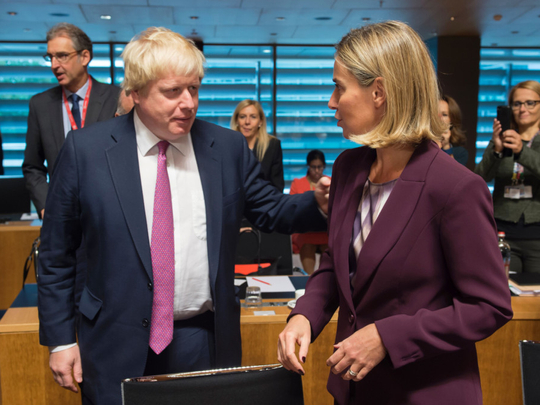
Everyone knew there was an alternative Boris Johnson column, the one where he votes remain (on Sunday, the Sunday Times newspaper reported Johnson asserted, in a previously unseen column, that remaining in the EU would be a “boon for the world and for Europe”). If we accept that his support for leave was a decisive factor in the campaign, this leads us to the mournful consideration of an alternative reality where we don’t shoot ourselves in the foot, and we haven’t woken up in the care of people who have decided to chop the foot off, because surgery is just very complex and boring, and a Briton with only one foot is still mightier than a person from any other nation with two serviceable feet.
Frankly, we were mourning already, and few of us had any illusions about Johnson himself, who tries on opinions like clothes, discarding them as the mood and weather takes him. He essayed this “ho, for the open seas!” garb apparently for fun, and finds himself thrust on to the world stage dressed as a clown. So you could say he’s already had his comeuppance; whether he’ll ever have the self-awareness to realise it is merely a coda to this disaster.
None of the arguments in his remain column are surprising. He pointed out that there would probably be an economic shock, which was obvious. He raised the prospects of a disgruntled Scotland, an emboldened Russia, a Europe in which your children and grandchildren aren’t free to work, to sell things, to make friends, to find partners — all true, none of it original The only thing at all eye-opening about the column, for those of us who don’t read him regularly, is how bad it is: strewn with references that range from irrelevant to plain wrong, unpersuasive, linguistically childish, structurally shambolic. It isn’t the most dangerous thing about him, in his current incarnation as foreign secretary, but it is one of the most dispiriting, that we’re forced to think deeply about the actions of a politician who wouldn’t himself entertain such an activity for longer than five minutes.
No serious government would have Johnson in its cabinet, but would that he were an aberration. British Prime Minister Theresa May’s appointments — most recently, the announcement of her European Union exit and trade committee — are all made to appease the most extreme elements of her party. Boris Johnson, David Davis, Liam Fox, Chris Grayling, Andrea Leadsom, Amber Rudd, Priti Patel, Patrick McLoughlin — leaving aside the specific deficiencies of each character, they are all known now as “hard Brexiters”, for which the umbrella term is “political extremists”.
After the acres of print and aeons of time spent discussing the extremist takeover of the Labour Party, a more pressing matter has been left more or less ignored. The actual party of government has been seized by its radical wingWe worry about the toxicity of their rhetoric and the chaos they create while leaving tactfully unsaid that this is because they are fanatics. Political extremism is often diagnosed in isolation, and used as a cover for some other objection. It is impossible to call an idea extreme without considering the seriousness of the problem it sets out to solve.
A policy might look excessive if it were floated as a way to mend the north/south divide, but perfect reasonable and desirable if its aim were to combat climate change. Ideas to tackle inequality look a lot more swivel-eyed if you don’t accept the premise, believing equality to be broadly increasing on its own. So a hard Brexit — leaving the single market, leaving the customs union, halting the flow of labour, blaming the crashing pound on the Bank of England, dealing with shortages in agriculture and service industries by making prisoners pick fruit (this is the Sun’s big idea) — cannot on its own be termed extreme.
First, we must evaluate what the leave side set out to solve: a dislike of Donald Tusk and Jean-Claude Juncker; a generalised anxiety that the government kept promising to control its borders but didn’t seem able to; some confusion around laws concerning the shape of bananas, created by Boris Johnson (the confusion, not the laws); a desire to control things that no nation alone can control (how much its currency is worth relative to others; who wants to invest in it; mass movements of people escaping conflict). Their ideas would not survive pluralism in the smallest amount. Only now does the picture solidify: we are in the grip of the most fervent radicals, people willing to sacrifice everything — grants, investment, trade, security, standing, solidarity, legal apparatus built up by decades of painstaking cooperation — at the altar of a concept (sovereignty) that nobody really understands, and a principle (taking back control) that is abstract to the point of meaninglessness.
Extremism in politics carries a heap of associations, only some of them borne out: it is taken to be a short-lived state, being incapable of compromise; unlikely to make mature or sober decisions; incapable of accommodating a broad sweep of views and possibilities. This we can see writ large in the prime minister’s skirmishes with UK Chancellor Philip Hammond, the only member of government visibly considering the national interest. To let in a voice like Hammond’s would mean accepting certain realities: that the risks to our future prosperity are real and present; that an economic downturn cannot be dismissed as scaremongering when it is actually in train; that we do not hold every ace, or even any ace, in the coming negotiations, and some humility may be unavoidable; that business voices, even when they say things you don’t like, are not necessarily doing so for base self-interest.
These ideas cannot be permitted; the hard Brexiters have nothing but their confidence. It would not survive pluralism in the smallest amount. Other qualities attached to extremism are less evident: you’d expect the hard Brexiters to be taking delight in their own victory, where instead there is only a querulous obsession with naysayers. You’d think, given the burning fury of their convictions, that they would be overflowing with plans, yet the plan extends no further than to protect themselves from scrutiny and debate. You’d hope for consistency and coherence; in its place, the bizarre spectacle of a party claiming to have been against the single market all along, because Michael Gove once said so.To be simultaneously so certain, and yet so chaotic, is perhaps an inevitable condition for extremists, but one you’d only see when doomed to observe them at close range. The question is not whether they can last, but how much damage they can do before they fall.
— Guardian News & Media Ltd
Zoe Williams is a Guardian columnist.










